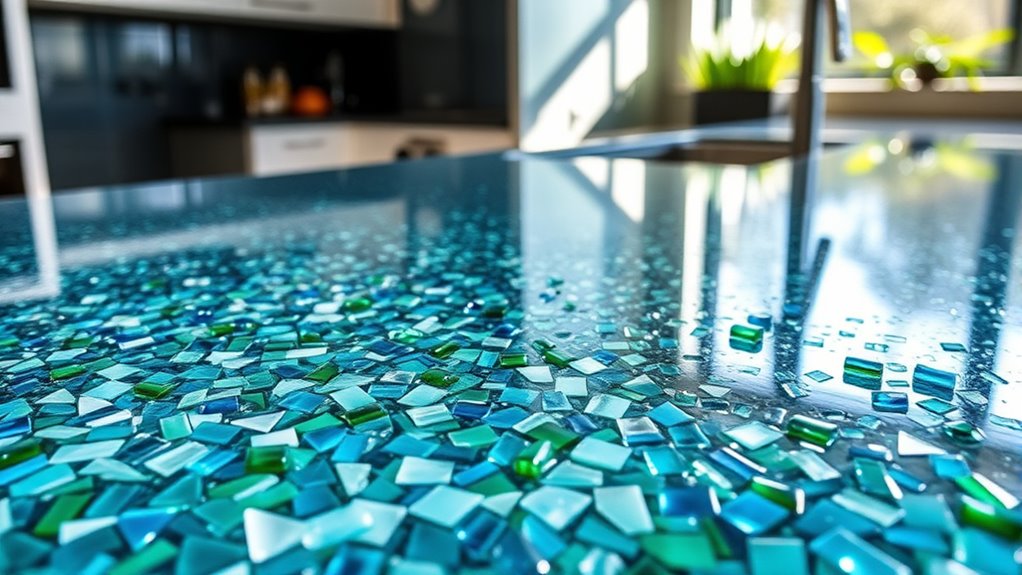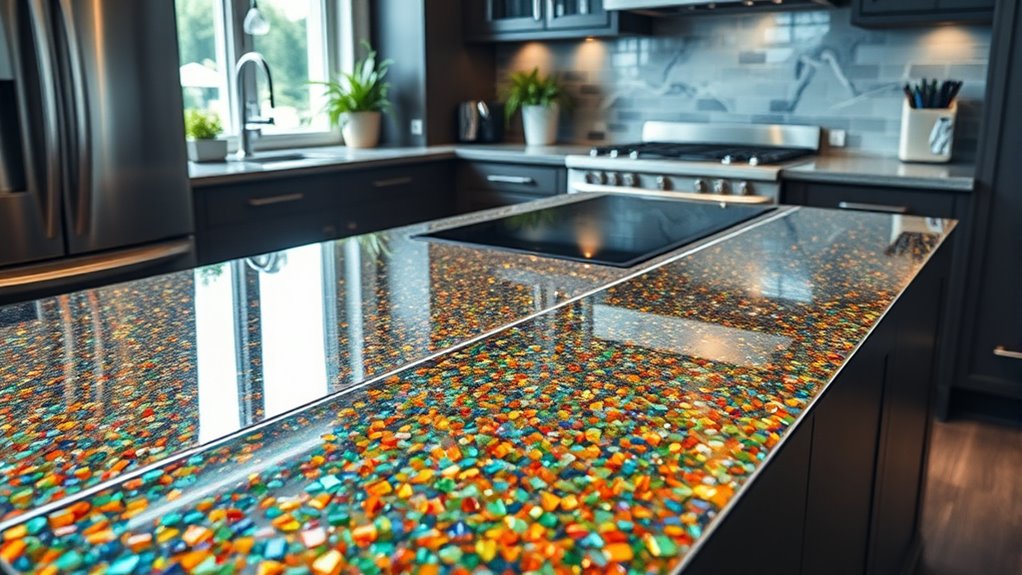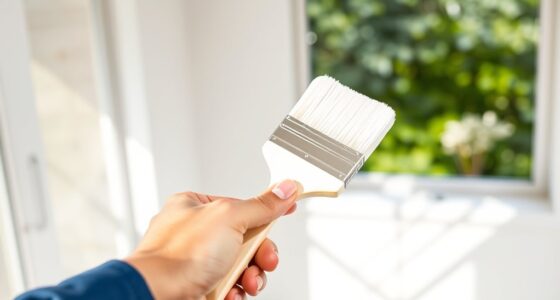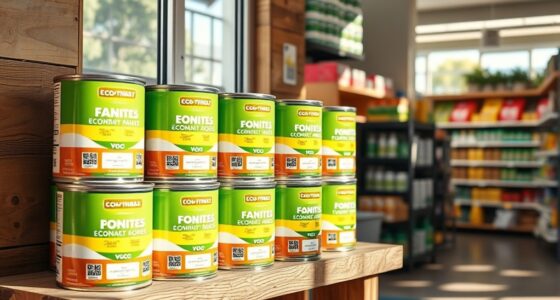Recycled glass countertops are more than just a trend—they’re a lasting green choice. Made from crushed recycled glass combined with resin or concrete, they reduce waste, lower environmental impact, and support sustainable practices. Though often more expensive initially, their durability and eco-friendliness can save you money long-term. If you want to discover how these surfaces combine style with sustainability and what makes them a smart choice for eco-conscious homes, keep exploring.
Key Takeaways
- Recycled glass countertops combine eco-friendliness with durability, making them a sustainable choice rather than just a trend.
- They utilize waste glass, reducing landfill impact and conserving natural resources, supporting long-term environmental benefits.
- Although initially more expensive, their longevity and low maintenance may offer cost savings over time.
- Growing consumer demand for sustainable materials suggests recycled glass countertops are a lasting green option.
- Their customizable design and eco credentials position them as a durable, environmentally responsible alternative in home decor.

Recycled glass countertops are an eco-friendly choice for homeowners looking to add style and sustainability to their kitchens and bathrooms. They’re made from crushed recycled glass combined with a resin or concrete base, creating a surface that’s both beautiful and environmentally conscious. One of the key advantages of choosing recycled glass is the emphasis on sustainable sourcing. Instead of relying on virgin materials, these countertops utilize glass that might otherwise end up in landfills, reducing waste and conserving natural resources. This makes them an appealing option if you’re committed to lowering your environmental footprint. However, it’s important to contemplate the cost implications of opting for recycled glass countertops. While they often cost more upfront than traditional options like laminate or standard granite, the investment can be justified by their durability and eco-credentials. The manufacturing process for recycled glass involves more specialized labor and materials, which can drive up prices. Additionally, sourcing high-quality recycled glass with consistent color and texture can add to the cost. Still, many homeowners find that the long-term benefits outweigh these initial expenses.
Beyond the cost, you should weigh the sustainability benefits. Recycled glass countertops help reduce the demand for new raw materials, saving energy and minimizing environmental impact during production. This sustainable sourcing aspect appeals to eco-conscious consumers who want their homes to reflect their values. Plus, recycled glass is often sourced locally, further decreasing the carbon footprint associated with transportation. When contemplating the cost implications, you should also think about maintenance and lifespan. Recycled glass surfaces are highly durable, resistant to scratches and stains when properly sealed, and require minimal upkeep. This longevity can offset some of the higher initial costs, especially when you factor in the reduced need for repairs or replacements over time. Additionally, choosing recycled glass can contribute to reducing waste and support circular economy practices.
While the price may be a concern, many suppliers now offer a range of options that can fit different budgets. The key is to do thorough research on the sourcing and manufacturing processes of the brand you’re considering. Some companies emphasize their commitment to sustainable practices, which can influence the overall cost but also ensure you’re making an environmentally responsible choice. Ultimately, recycled glass countertops balance style, sustainability, and cost considerations. If you prioritize eco-friendly living and are willing to invest a bit more upfront, they can serve as a lasting green solution that elevates your home’s aesthetic while supporting sustainable practices.
Frequently Asked Questions
How Durable Are Recycled Glass Countertops Compared to Traditional Materials?
You might wonder about durability compared to traditional materials. Recycled glass countertops are quite durable, resisting scratches and stains with proper care. Their environmental impact is positive because they reuse waste, reducing landfill. Plus, they offer aesthetic versatility, fitting modern or eclectic styles. While they may not be as scratch-resistant as some stones, with proper sealing and maintenance, they can last a long time, making them a solid, eco-friendly choice.
Are Recycled Glass Countertops More Resistant to Stains and Scratches?
While recycled glass countertops stand out with their vibrant design options, you might wonder if they resist stains and scratches. The good news is, they’re more resistant than you’d expect, especially with proper cleaning tips. Their non-porous surface helps prevent stains, and choosing a sealed surface minimizes scratches. So, you can enjoy their beauty while confidently maintaining them, making them a durable and eco-friendly choice for your space.
What Is the Average Cost Difference Between Recycled Glass and Natural Stone?
When comparing costs, recycled glass countertops typically cost slightly less than natural stone options. The price factors include material quality, design complexity, and installation. You might see a price difference of around $10 to $20 per square foot, with recycled glass being more budget-friendly. Keep in mind, your choice will also depend on durability, aesthetics, and environmental benefits, which can influence your overall investment.
How Eco-Friendly Are the Manufacturing Processes Involved?
You might wonder about the eco-friendliness of manufacturing recycled glass countertops. The recycling process reduces waste and conserves resources, making it quite sustainable. Material sourcing is also environmentally friendly since it utilizes post-consumer glass, decreasing landfill contributions. However, some manufacturing steps involve energy use and chemical treatments, which can impact overall eco-friendliness. Overall, if the process emphasizes recycling and responsible sourcing, it’s a greener choice compared to traditional materials.
Can Recycled Glass Countertops Be Repaired if Damaged?
Think of your recycled glass countertop as a delicate stained glass window—you can’t just replace a pane easily. If damaged, you have repair options like epoxy fillers or professional refinishing. Maintenance tips include gentle cleaning and avoiding harsh chemicals. While small chips or scratches may be fixable, extensive damage might require replacing the affected section. Regular care helps keep your countertop beautiful and damage-free longer.
Conclusion
Recycled glass countertops are like a fresh breath of spring in your home—bright, sustainable, and full of promise. They blend style with eco-consciousness, proving that beauty and environmental responsibility can walk hand in hand. While trends may fade, choosing recycled glass is like planting a seed for lasting change—an investment in a greener future. So, consider this option not just as a surface, but as a foundation for mindful living.









